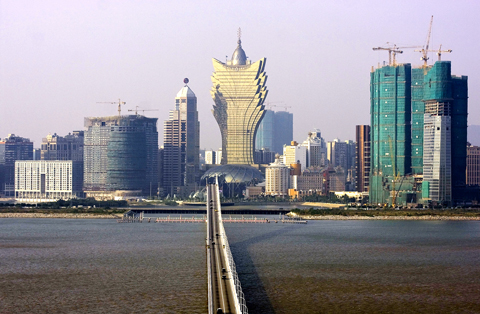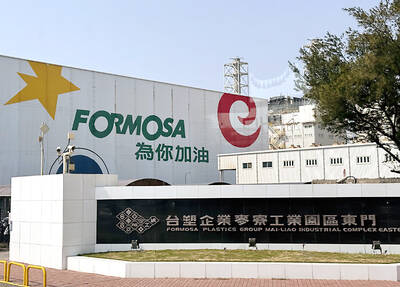The baccarat tables at the Venetian’s Red Dragon section still teem each night with hundreds of the Chinese players who’ve fueled Macau’s breathtaking shot to the top of the gambling world.
But as gamblers place bets of 500 patacas (US$65) and more in Las Vegas Sands’ popular casino, cheering and bellowing with each flip of a hand, construction cranes stand idle atop hulking steel shells of three half-finished hotel towers across the street.
The hot streak that turned Macau into the world’s gambling capital is cooling as global economic and financial woes delay new projects, cut into incomes and hurt tourism. Tightened travel restrictions on Chinese tourists, the engine behind Macau’s growth, also are taking a toll, and revenue growth is slowing for the first time in years.

PHOTO: BLOOMBERG NEWS
“Without a doubt, the incredible heat that we’ve seen in the market before is coming off,” said Anthony Lawrence (a former managing editor of the Taipei Times), publisher of the territory’s Destination Macau magazine.
The silenced towers are among the projects where struggling Las Vegas Sands Corp suspended work two weeks ago as part of its effort to comply with debt agreements backed by its Las Vegas properties.
It was a drop in Sands’ Las Vegas earnings that partly triggered the construction halts. But the troubles aren’t unique to Sands or to Las Vegas, where revenues are down across the board.
In Macau, Galaxy Entertainment Group Ltd likely won’t open its entire 2,500-room Cotai Mega Resort in Macau on time next year, some analysts say, because of a possible funding gap. And a US$2.5 billion joint venture gambling resort called Macau Studio City, near Sands’ two suspended sites on a stretch of reclaimed land known as the Cotai Strip, could face delays as well.
Macau, the only place in China where gambling is legal, boomed after the government broke up a local company’s long-standing monopoly six years ago and started welcoming US gambling powerhouses such as Sands, Wynn Resorts Ltd and MGM Mirage Inc.
As the operators built one glitzy casino-resort after another, gamblers showed up by the millions — more than half of them from China — and profits surged. By 2006, this tiny, former Portuguese colony, surpassed Las Vegas as the world’s most lucrative gambling center.
From 2003 to last year, Macau gambling revenue nearly tripled to 83 billion patacas. And this year it’s on track to top US$13 billion — more than double the take in Las Vegas. But signs of a slowdown are emerging. While an average of five casinos sprouted annually between 2004 and this year, next year may see only one major opening, from Melco Crown Entertainment Ltd.
Casino revenue, while well ahead of last year, slipped 10 percent in the third quarter from the previous three months, the second straight quarter-to-quarter decline. Macau’s leader says average monthly revenues could drop next year to 7 billion patacas compared with more than 9 billion monthly through September this year.
Fresh problems surfaced two weeks ago when Sands, the city’s leading casino operator by market share, indefinitely halted construction at its Macau projects — including Shangri-La, Traders and Sheraton hotels as well as casinos — throwing as many as 11,000 out of people out of work. Sands officials say they’re in talks with banks about new financing, but it’s unclear how long that will take or when construction might resume.
Sands president William Weidner suggested last week Sands won’t invest more until the company sees how Beijing’s policies toward Macau shake out.
There may be a silver lining in the slowdown: a break from the furious pace of development and a chance for the industry to catch its breath. Given travel curbs and global economic weakness, the crowds packing Macau’s casinos might start thinning if more were to open.
“It’s good we’ve got a slowdown,” said analyst Billy Ng at JP Morgan Securities. “Ambitions were too big.”
Slackening economic growth in and around China is at least partly to blame for slowing revenue growth in Macau. Guangdong Province, a major source of Macau visitors, is reeling from job losses and factory closures as the global downturn cuts demand for the country’s exports.
Across China, falling stock markets and housing prices have caused a painful destruction of wealth. In Hong Kong, the economy slipped into recession last quarter.
The bigger reason for a drop-off that large may be gradually tightening visa rules that, among other things, now limit to once every three months the times Guangdong residents can go to Macau.
Chinese tourists are vital, accounting for more than half of Macau’s revenues. While the changes might be temporary, the impact already is evident. Tourist arrivals in September grew by a paltry 2 percent compared with the same period last year; by comparison, they grew by nearly 30 percent in September last year from 2006.
Never fully explained by Beijing, the restrictions are seen as an attempt by the government to control Macau’s galloping growth.
Though China has benefited from Macau’s rise — thousands of have found new jobs, and huge quantities of building supplies like cement and steel are sourced from mainland firms — officials may be worried about gambling’s effect on society, analysts says. Laundering by corrupt authorities and clashes over unpaid gambling debts are likely among the concerns.
With average salaries of China’s 1.3 billion people on the rise, there’s still huge growth potential for Macau and it casinos, even with the visa changes.
“You’ll see some weakness driven by the visa restrictions and the softening of the regional economies, but I think the long-term prospects are very positive,” said Gary Pinge of Macquarie Securities in Hong Kong. “Macau has just barely scratched the surface of China.”
Casino mogul Steven Wynn, whose company operates one resort in Macau and has another on the way, is taking the slowdown in stride: “We’re not having these huge increases, but who says that you’re entitled to that every few years? Where did that become a law of nature?”
He’s still bullish on the city’s long-term fortunes.
“I think the market is wonderful in China,” he said in a telephone interview. “Macau has always been a tourist kind of place, and it’s broadened ... its appeal. And I think that’s going to continue.”
Sheng Yaopeng, a 26-year-old TV camera operator from Beijing, isn’t concerned either.
He was calm as he talked about losing 30,000 patacas at the baccarat tables over several days in Macau. The losses wouldn’t keep him from returning. Neither would any of the other problems in and outside Macau.
“We only come a few times a year now ... but we will still come,” Sheng said.

EXTRATERRITORIAL REACH: China extended its legal jurisdiction to ban some dual-use goods of Chinese origin from being sold to the US, even by third countries Beijing has set out to extend its domestic laws across international borders with a ban on selling some goods to the US that applies to companies both inside and outside China. The new export control rules are China’s first attempt to replicate the extraterritorial reach of US and European sanctions by covering Chinese products or goods with Chinese parts in them. In an announcement this week, China declared it is banning the sale of dual-use items to the US military and also the export to the US of materials such as gallium and germanium. Companies and people overseas would be subject to

Taiwan Semiconductor Manufacturing Co (TSMC, 台積電) founder Morris Chang (張忠謀) yesterday said that Intel Corp would find itself in the same predicament as it did four years ago if its board does not come up with a core business strategy. Chang made the remarks in response to reporters’ questions about the ailing US chipmaker, once an archrival of TSMC, during a news conference in Taipei for the launch of the second volume of his autobiography. Intel unexpectedly announced the immediate retirement of former chief executive officer Pat Gelsinger last week, ending his nearly four-year tenure and ending his attempts to revive the

WORLD DOMINATION: TSMC’s lead over second-placed Samsung has grown as the latter faces increased Chinese competition and the end of clients’ product life cycles Taiwan Semiconductor Manufacturing Co (TSMC, 台積電) retained the No. 1 title in the global pure-play wafer foundry business in the third quarter of this year, seeing its market share growing to 64.9 percent to leave South Korea’s Samsung Electronics Co, the No. 2 supplier, further behind, Taipei-based TrendForce Corp (集邦科技) said in a report. TSMC posted US$23.53 billion in sales in the July-September period, up 13.0 percent from a quarter earlier, which boosted its market share to 64.9 percent, up from 62.3 percent in the second quarter, the report issued on Monday last week showed. TSMC benefited from the debut of flagship

TENSE TIMES: Formosa Plastics sees uncertainty surrounding the incoming Trump administration in the US, geopolitical tensions and China’s faltering economy Formosa Plastics Group (台塑集團), Taiwan’s largest industrial conglomerate, yesterday posted overall revenue of NT$118.61 billion (US$3.66 billion) for last month, marking a 7.2 percent rise from October, but a 2.5 percent fall from one year earlier. The group has mixed views about its business outlook for the current quarter and beyond, as uncertainty builds over the US power transition and geopolitical tensions. Formosa Plastics Corp (台灣塑膠), a vertically integrated supplier of plastic resins and petrochemicals, reported a monthly uptick of 15.3 percent in its revenue to NT$18.15 billion, as Typhoon Kong-rey postponed partial shipments slated for October and last month, it said. The